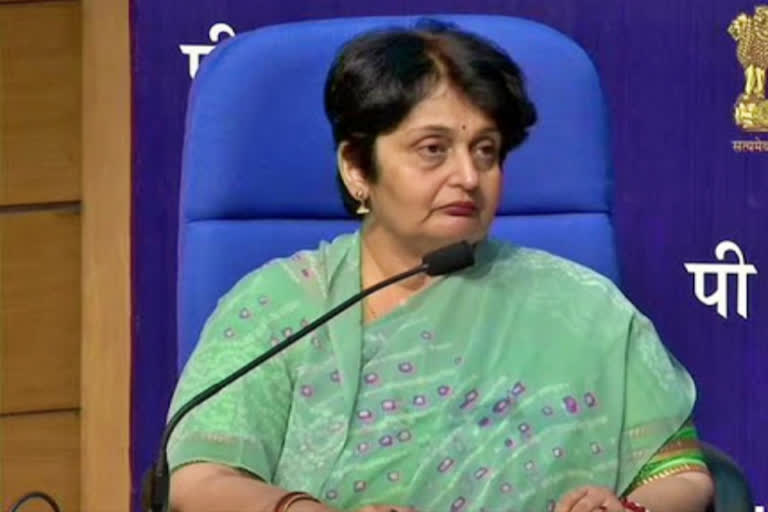New Delhi: As India is entering into lockdown 4.0 on Monday possibly with wide relaxations, Union Health Secretary Preeti Sudan on Saturday discussed strategies to manage Covid19 with municipal bodies and district administrations from 12 worst affected states across the country.
Principal Health Secretaries, Municipal Commissioners, DMs and other officials from the 30 municipal areas of Maharashtra, Tamil Nadu, Gujarat, Delhi, Madhya Pradesh, West Bengal, Rajasthan, Uttar Pradesh, Telangana, Andhra Pradesh, Punjab and Odisha took part in the meeting.
These areas contribute almost 80 per cent of the country's Covid-19 cases.
The Health Ministry told the local administrations that maintaining high vigilance and monitoring in areas of old cities, urban slums and other high-density pockets along with the camps for migrant workers are important for managing COVID-19 in the urban areas.
All the state officials were briefed about the factors to be considered while mapping the containment and buffer zones; the activities mandated in containment zone like perimeter control, active search for cases through the house to house surveillance, contact tracing, testing protocol, clinical management of the active cases; surveillance activities in the buffer zone like monitoring of SARI and ILI cases, ensuring social distancing, promoting hand hygiene.
With an increase of 3970 Covid19 positive cases in the last 24 hours, India’s total COVID figure stands at 85,940. A total of 30,150 people have been cured. Since Friday, 2233 patients were found cured taking the recovery rate to 35.09 per cent.
Health Secretary Sudan emphasised on the need for timely tracing of patients to improve recovery percentage, SARI-ILI Surveillance, and more effective human resource management.
“It was advised that all health service providers need to be provided with adequate protective gear and communication must focus against the stigmatization of these frontline health workers. Maintenance of sanitation standards of the relief and isolation camps, and waste management from the homes of COVID-19 cases was also stressed upon,” officials said.
It was also highlighted that especially in the densely populated urban areas further challenges need to be considered like poor socio-economic conditions, limited health infrastructure, lack of social distancing, issues faced by women among other factors.
Referring to the Covid19 management guidelines, the meeting highlighted that in general the geographic area of containment zones to be defined based on factors like mapping of cases & contacts, geographical dispersion of cases and contacts, area with well-demarcated perimeter and enforceability.
“For Municipal Corporations, residential colonies, mohallas, municipal wards or police-station areas, municipal zones, towns can be designated as containment zones, as appropriate,” Sudan said in the meeting.
It was advised that the area should be appropriately defined by the district administration and local urban body with technical inputs from the local level. Along with the containment zones, the buffer zone around the containment zone also must be demarcated to break the chain of transmission.
Health Secretary Sudan also emphasized that along with the containment and management of COVID-19 cases, the issue of continuing all essential non-COVID health services in the urban localities like RMNCHA+N care, cancer treatment, TB surveillance, immunization efforts, vector control measures in view of the ensuing monsoon, also need to be ensured.
The municipal authorities were asked to focus on effective risk communication in order to build trust and confidence. They were requested to engage with community leaders and local opinion leaders who could accompany the local surveillance teams to encourage cooperation from the local communities.
During the meeting, Mumbai shared its experience of “Containment leaders”, who were local community elders and leaders working with the Ward Officers to support the government efforts in encouraging the people, particularly in the slum clusters.
Also Read: India to set up research reactor for affordable treatment of cancer, other diseases



